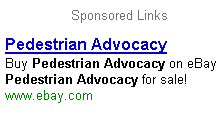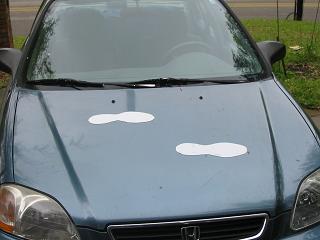What's in a Link?
 What's with all the links?
What's with all the links?I just added them in the last day or so. I wanted links associated with what this blog is all about--making biking and walking viable in our cities. So far, most of what we get for "alternative transportation" is lip service. Most of the battles we fight are boring, beauracratic ones. Get projects identified, listed on the municipal transportation plan, funded, planned, and built. It's dull and it takes forever and these links connect us to people who know how to do it.
The League of American Bicyclists is the only national bicycling advocacy organization. Thanks largely to their work and a few bicyclists in Congress, we have the TEA-21 Act, a partial renewal of the original ISTEA. I'll talk more about that later, but it's the paltry federal funding for bike/ped facilities and it goes a long way.
The Florida Bicycle Association works hard in Florida to promote cycling, educate cyclists and motorists, and help local advocacy organizations with their battles. FBA worked hard to get the "Share the Road" license plate. They produce the Law Enforcement Guide and provide training for police on how to enforce the law when it comes to bicyclists.
The CRTPA (crap-teh) is the Capital Regional Transportation Planning Agency for the greater Tallahassee area that now includes all of Leon County and some of the surrounding counties. This particular link is hot-linked (their site uses frames *ugh*) to the Bicycle Pedestrian Master Plan that the CRTPA passed back when it was just a little MPO (Metropolitan Planning Organization--more on this later). The BPMP was adopted as part of the Comprehensive Plan, the guiding document for development in Leon County, and has the force of law. Since then, it has been largely ignored. The BPMP lays out some specific goals and projects. BikeWalk Network, the advocacy organization, is following up on the BPMP to see that it gets implemented.
Florida DOT Safety Office is the Bike/Ped office. That office produces a great deal of literature for general consumption about bike safety and pedestrian safety. Some of it is even aimed at motorists. They are a resource and an authority on the way things are. Sometimes they have great insight into the way things ought to be.
Florida Statutes lay out the legal basis for bicyclists and pedestrians. Most of the transportation laws are based on a Uniform Traffic Code that is standard for most states. This is where we go for our understanding of the way things were intended.
The National Center for Bicycling and Walking (NCBW) also known as bikewalk.org is probably best recognized as the organizer of the ProWalk ProBike Conference series. It's next conference is in September in Madison, WI. Oddly enough, primary sponsors of the conference are the National Highway Traffic Safety Administration (NHTSA, nit-seh) and the Federal Highway Administration (FHWA, feh-wah?) whom I generally regard to be from the dark side. Another big sponsor is Bikes Belong, an organization made up of bidnezz people from bicycle companies like Shimano, Trek and Specialized. In their own words:
Bikes Belong is the national coalition of bicycle suppliers and retailers working together to put more people on bicycles more often. Through national leadership, grassroots support, and promotion, we work to make bicycling safe, convenient, and fun.In an environment where automotive and petroleum companies are buying federal policy, it's nice to know that Big Bikes is finally getting organized and throwing its weight around.
The next few links are pedestrian advocacy organizations that I don't know much about with the exception of Walkable Communities. Dan Burden was our very first DOT Bike/Ped Coordinator for the state of Florida and he was very good. He laid a solid groundwork in an environment that was not overly receptive to his purpose. He has since moved on and gotten a lucrative consulting gig travelling the country and advising cities on how to develop more walkable communities (hence the name). Feet First quotes Dan on their home page and I'm sure America Walks is intimately familiar with his work.
The Surface Transportation Policy Project is a diverse, nationwide coalition working to ensure safer communities and smarter transportation choices that enhance the economy, improve public health, promote social equity, and protect the environment. I know it best for it's "Mean Streets" report that found four of the top ten deadliest cities for pedestrians in the country are in Florida.
The Association for Commuter Transportation had their Southeast Conference in Tallahassee a few years ago. We had some local advocacy that dovetailed with it but never got far. The local affiliate organization is CommuterServices of North Florida, the primary sponsor of Commuter Choices Week, an annual event that bribes drivers to ride the bus for a day in exchange for bagels and a T-shirt. The 2006 event is the week of September 22. I'll be promoting it shamelessly and trying to springboard people to real changes in their commuting habits.
The Manual on Uniform Traffic Control Devices (MUTCD) contains the standards for building facilities. It is a powerful friend and an awesome foe. If you want a facility built and you can support the design with the MUTCD, then you can talk with the Traffic Engineers in their own language and show them that it can be done. If, on the other hand, you want to do something that has not been done before--and many many bike/ped solutions fall into this category--then you must attempt the vain and hopeless argument that it should be done although it has never been done before.
The National Committee on Uniform Traffic Laws and Ordinances is another double-edged butter knife. Their purpose is to standardize traffic laws so you don't have to ride on the other side of the road when you cross state lines. Remember that Uniform Traffic Code thing I mentioned back up by the Statutes, these are the sheepdogs who keep state statutes on the UTC ranch. If they push for good laws that help, protect and promote bicyclists and pedestrians, those laws are likely to role out in state statutes. If they push laws that restrict our mobility, then we have a harder time at the local level.
So that's the big link round-up. I've got a lot more to say about several of these and a lot more to learn about several others. I know no one is reading this blog yet, but if you want to recommend a link, click on over to comments and make your case.


1 Comments:
This comment has been removed by a blog administrator.
Post a Comment
<< Home